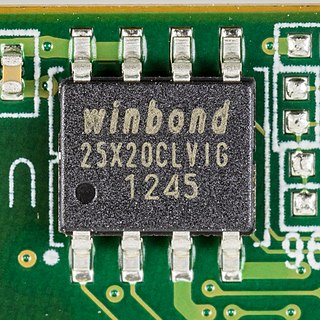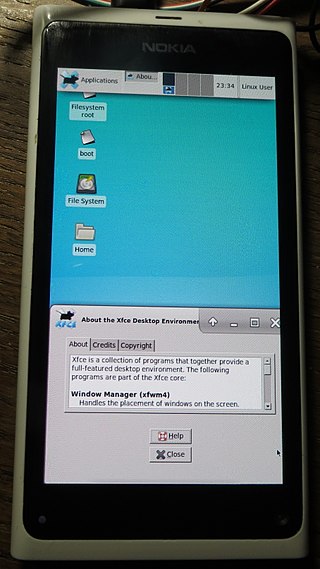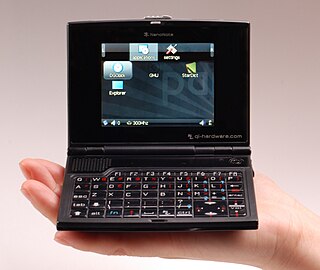
In the context of an operating system, a device driver is a computer program that operates or controls a particular type of device that is attached to a computer or automaton. A driver provides a software interface to hardware devices, enabling operating systems and other computer programs to access hardware functions without needing to know precise details about the hardware being used.

Free software, libre software, libreware sometimes known as freedom-respecting software is computer software distributed under terms that allow users to run the software for any purpose as well as to study, change, and distribute it and any adapted versions. Free software is a matter of liberty, not price; all users are legally free to do what they want with their copies of a free software regardless of how much is paid to obtain the program. Computer programs are deemed "free" if they give end-users ultimate control over the software and, subsequently, over their devices.
The free software movement is a social movement with the goal of obtaining and guaranteeing certain freedoms for software users, namely the freedoms to run, study, modify, and share copies of software. Software which meets these requirements, The Four Essential Freedoms of Free Software, is termed free software.

In computing, firmware is software that provides low-level control of computing device hardware. For a relatively simple device, firmware may perform all control, monitoring and data manipulation functionality. For a more complex device, firmware may provide relatively low-level control as well as hardware abstraction services to higher-level software such as an operating system.

The GNU Project is a free software, mass collaboration project announced by Richard Stallman on September 27, 1983. Its goal is to give computer users freedom and control in their use of their computers and computing devices by collaboratively developing and publishing software that gives everyone the rights to freely run the software, copy and distribute it, study it, and modify it. GNU software grants these rights in its license.

The Linksys WRT54G Wi-Fi series is a series of Wi-Fi–capable residential gateways marketed by Linksys, a subsidiary of Cisco, from 2003 until acquired by Belkin in 2013. A residential gateway connects a local area network to a wide area network.

Free and open-source software (FOSS) is software that is available under an open-source license that grants the right to use, modify, and distribute the software, modified or not, to everyone free of charge. The public availability of the source code is, therefore, a necessary but not sufficient condition. FOSS is also a loosely associated movement of multiple organizations, foundations, communities and individuals who share basic philosophical perspectives and collaborate practically, but might diverge in detail questions. The historical precursor to this was the hobbyist and academic public domain software ecosystem of the 1960s to 1980s. FOSS is an inclusive umbrella term for free software and open-source software. FOSS is in contrast to proprietary software, which consists of software under restrictive copyright or licensing as well as software with undisclosed source code.

The free-culture movement is a social movement that promotes the freedom to distribute and modify the creative works of others in the form of free content or open content. They encourage creators to create such content by using permissive and share-alike licensing, like that used on Wikipedia.
In the context of free and open-source software, proprietary software only available as a binary executable is referred to as a blob or binary blob. The term usually refers to a device driver module loaded into the kernel of an open-source operating system, and is sometimes also applied to code running outside the kernel, such as system firmware images, microcode updates, or userland programs. The term blob was first used in database management systems to describe a collection of binary data stored as a single entity.

Linux is a family of open-source Unix-like operating systems based on the Linux kernel, an operating system kernel first released on September 17, 1991, by Linus Torvalds. Linux is typically packaged as a Linux distribution (distro), which includes the kernel and supporting system software and libraries—most of which are provided by third parties—to create a complete operating system, designed as a clone of Unix and released under the copyleft GPL license.

The Chumby was a consumer electronics product formerly made by Chumby Industries, Inc. It is an embedded computer which provides Internet and LAN access via a Wi-Fi connection. Through this connection, the Chumby runs various software widgets. In 2010 Sony introduced a single product based on an offshoot version of Chumby, the Sony Dash.

Ingenic Semiconductor is a Chinese fabless semiconductor company based in Beijing, China founded in 2005. They purchased licenses for the MIPS architecture instruction sets in 2009 and design CPU-microarchitectures based on them. They also design system on a chip products including their CPUs and licensed semiconductor intellectual property blocks from third parties, such as Vivante Corporation, commission the fabrication of integrated circuits at semiconductor fabrication plants and sell them.

According to the Free Software Foundation Latin America, Linux-libre is a modified version of the Linux kernel that contains no binary blobs, obfuscated code, or code released under proprietary licenses. In the Linux kernel, those types of code are mostly used for proprietary firmware images. While generally redistributable, they do not give the user the freedom to audit, modify, or, consequently, redistribute their modified versions. The GNU Project keeps Linux-libre in synchronization with the mainline Linux kernel.

The hacking of consumer electronics is a common practice that users perform to customize and modify their devices beyond what is typically possible. This activity has a long history, dating from the days of early computer, programming, and electronics hobbyists.
OpenWrt is an open-source project for embedded operating systems based on Linux, primarily used on embedded devices to route network traffic. The main components are Linux, util-linux, musl, and BusyBox. All components have been optimized to be small enough to fit into the limited storage and memory available in home routers.
M-Labs is a company which develops, manufactures and sells open hardware devices and software. It is known for the Milkymist System-On-Chip (SoC) which is a commercialized system-on-chip with free HDL source code.

The Ben NanoNote is a pocket computer using the Linux-based OpenWrt operating system. An open-source hardware device developed by Qi Hardware, it has been called possibly "the world's smallest Linux laptop for the traditional definition of the word.". In addition, the Ben NanoNote is noteworthy for being one of the few devices on the market running entirely on copyleft hardware.
Werner Almesberger is an Austrian free software computer programmer and an open-source hardware designer/maker. He is mainly known as a hacker of the Linux kernel.

LibreCMC is a Linux-libre distribution for computers with minimal resources, such as the Ben NanoNote, ath9k-based Wi-Fi routers, and other hardware with emphasis on free software. Based on OpenWrt, the project's goal is to aim for compliance with the GNU Free System Distribution Guidelines and ensure that the project continues to meet these requirements set forth by the Free Software Foundation (FSF). LibreCMC does not support ac or ax due to a lack of free chipsets.















